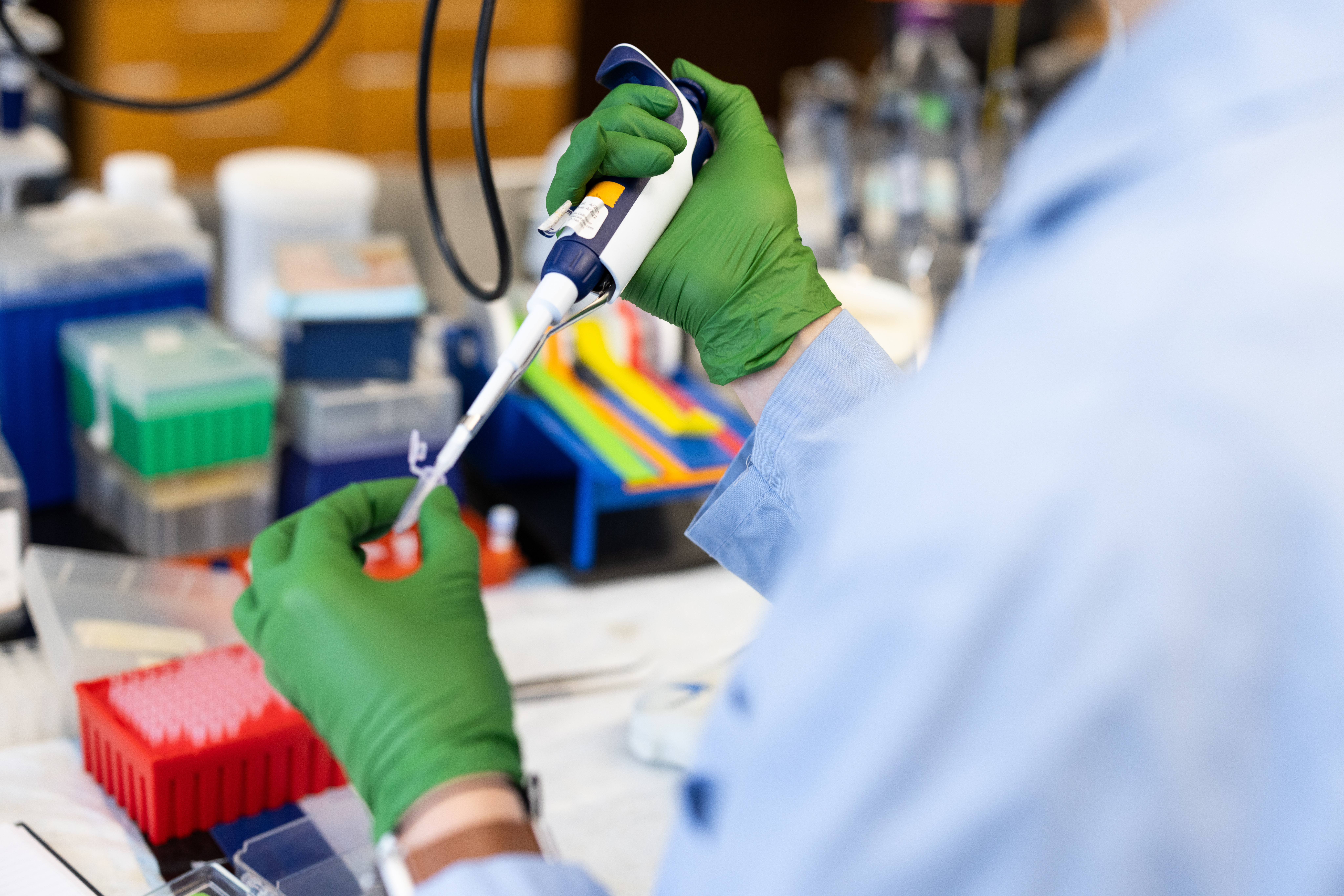
Beta Beta Beta (TriBeta), the national Biological Honor Society, awarded four biology majors research grants from the Beta Beta Beta Research Foundation. These promising students followed their interests to further important research that went beyond the typical undergraduate curriculum requirements. Read about the projects the four awardees have been working on, in their own words, below.
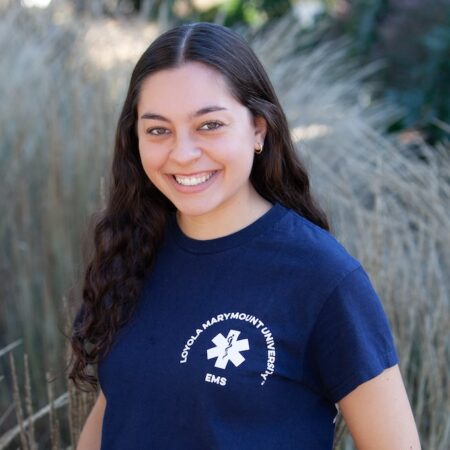
Clare Houston, a senior mentored by Biology Associate Professor Maria Christina Vasquez, was awarded a grant for the project, “Examination of Hemolymph Osmolarity in the Mussel M. Galloprovincialis in Response to Hyposalinity Changes.”
My project looks at how marine mussels, specifically a species on our coast called Mytilus galloprovincialis, responds to hyposalinity (low salinity) changes. Our lab measured this in multiple ways, but my research used the mussels’ hemolymph (equivalent of blood) to measure their physiological response. In the big picture, this helps us understand how this mussel, and possibly other organisms, will respond to climate change as it continues. “I was excited to take on this project because it would require measuring a different physiological metric than I had previously been doing but would build off my knowledge from previous projects. I also got to use a new piece of equipment to the lab, an osmometer, which I enjoyed and helped me develop new techniques when extracting and preparing samples to use in the machine.
My research grant through Tri-Beta will allow me to continue this research next semester, measuring the same metric (hemolymph osmolarity) in response to hyposalinity, but adding in a new variable of season and associated weather changes. Having both the data from fall and spring will allow us to compare and draw conclusions about how M. galloprovincialis performs throughout the year.
My mentor, Dr. Vasquez, has supported and guided me in more ways than I can count. She has guided me through every step of the research process but also given me the space to work independently and develop in-lab techniques and scientific writing skills on my own. She has been a role model for me as a successful and skilled woman in science, and I am inspired by her to joyfully pursue a path of study that I am passionate about.”
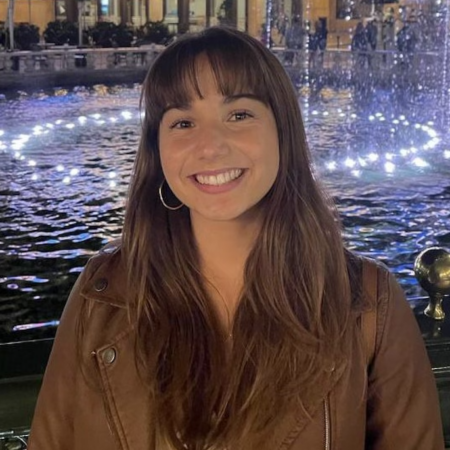
Jacqui Raetz-Vigon, a senior honors program student mentored by Biology Associate Professor Kristen Covino, was awarded a grant for the project, “Dietary Isotopic Ecology of Great Black-Backed Gulls.”
In the Dietary Isotopic Ecology of Great Black-backed Gulls project, we analyze the isotope ratio of Carbon and Nitrogen in the feathers and blood of both breeding adult gulls and chicks. These isotopes tell us where the gulls are getting their food from (terrestrial or marine sources) and the trophic level of the food. We can use this to understand what gulls are eating, and this information can eventually be used to inform important conservation efforts.
As a child, my stepdad and I built an aviary in our backyard, and ever since then, I have been fascinated by birds. My freshman year of college, I listened to Dr. Covino’s presentation on one of the other projects in her lab, and between how amazing I thought the organism of study was and the engaging way she presented the topic, I knew that I wanted to join her research lab. I have loved my time leading the gull isotopes project, and the BBB grant will allow us to purchase needed materials to process more feathers and make progress toward answering our research questions.
I would not have gotten this grant or become the student-researcher I am today without the mentorship of Dr. Covino. In addition to teaching me the technical aspects of our work, Dr. Covino helped me become a better scientific writer. Her dedication and drive inspire me to have the same determination to propel our research forward. Most importantly, Dr. Covino fosters an uplifting laboratory environment and combines her deep knowledge with relatability and humor, providing a great model of lab leadership that I hope to utilize in my future endeavors.
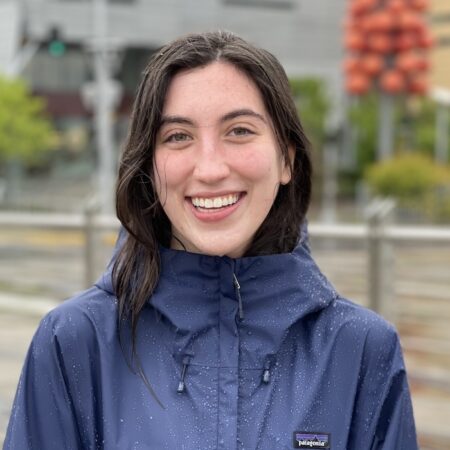
Caroline Thorpe, a senior mentored by Biology Professor Deepa Dabir, was awarded a grant for the project, “The Unfolded Protein Response of the Endoplasmic Reticulum Supports Aim32 Function in Mitochondrial Biogenesis.”
I study the mitochondria of yeast cells (S. cerevisiae), commonly known as the “powerhouse of the cell”, and the mechanisms of protein import into mitochondria which can help determine the process by which defects in mitochondrial function lead to disease. This specific project investigates the cooperation between the endoplasmic reticulum and the mitochondria. Proteins that can’t get into the mitochondria will get backed up into the endoplasmic reticulum, which stresses the cell out. I am working on determining which stress responses are able to compensate for this stress and how so – whether that be protein mis-localization, up-regulation of transcription of genes related to chaperone proteins, or apoptosis (cell death).
The pathway I am specifically investigating is the Unfolded Protein Response of the ER (UPR), and I am trying to uncover what happens to the cell’s health when UPR and mitochondrial protein import are defective. When these mechanisms are defective, it can lead to protein aggregation (or clumping) which is known to be a factor that causes neurodegenerative disease in humans.
I was drawn to this project because of its focus on cooperation within the cell. We learn in biology classes about each cellular component and their functions, but sometimes it gets lost in textbooks how incredibly important it is that all these components in a cell function as a team. In order to understand the entire cellular function under these stressful conditions, I have to look at pathways of the cell which have different functions, and these pathways are all comprised of differently structured macromolecules that all interact together like a very well choreographed performance. It’s really cool to see the communication both within the mitochondria and between the mitochondria and other organelles and how important this cooperation within the cell is. This research grant will allow me the resources for new experiments – one for example called split-GFP microscopy. GFP is a fluorescent protein that we can split and attach to two proteins. If these proteins mis-localize in the cell during mitochondrial import and UPR stress, then we will see varying degrees of fluorescence based on the distance between the two GFP-tagged proteins. This allows us to determine if any proteins that are supposed to be in the mitochondria are leaving or not making it to the mitochondria in the first place, and if they aren’t there, then where exactly in the cell are they.
Seaver College has been a tremendous support. I have been able to participate in SURP, SOAR, and RAINNS which have provided me with time and resources to conduct research. Additionally, the poster sessions for SOAR and LMU URS have prepared me to attend conferences outside of LMU. My research mentor Dr. Deepa Dabir has always been so amazing as a role model being a really cool woman in molecular biology and she has always provided me with opportunities to conduct research. She has very high expectations, and when I run into troubles, she has taught me to try and figure out the problems on my own rather than handing me a fix which has been a really good skill to develop. She is incredibly knowledgeable and really supports the development of my own knowledge of molecular biology by always being willing to explain topics and answer questions.
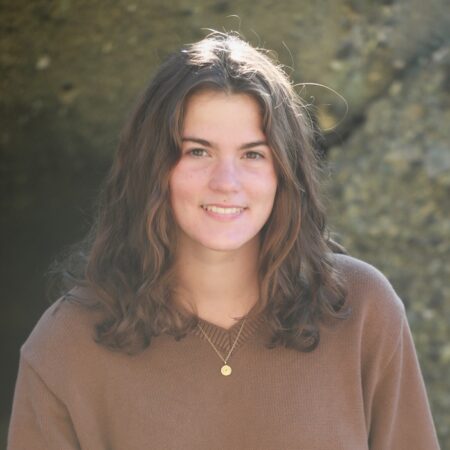
Frances Dygean, a junior mentored by Biology Associate Professor Kristen Covino, was awarded a grant for the project, “The Effect of Testosterone Levels on Aggression in Larus Marinus (the Great Black-Backed Gull).”
Our project explores the relationship between the hormone testosterone and aggression in Larus marinus (The Great Black Backed Gull). We quantify the testosterone of individual gulls through fecal-hormone extraction techniques, and relate it to aggression scores from individual birds. “My passion for physiology initially sparked my interest in the project. I did not originally know a lot about the importance of this particular gull species, but as I have continued my involvement in the project, I have grown an appreciation for the species and its power to indicate ecological wellness.
My research grant will directly fund a testosterone assay kit, so that more of our samples can be quantified for testosterone and compared to aggression scores. In essence, it will allow us to continue to expand our data and perform statistical tests to determine the correlation between testosterone and aggression levels. Dr. Covino has been an incredible mentor to me. She took me under her wing and not only showed me how to perform the research we do, but answered my curiosity questions along the way. She is understanding, kind, and humorous at times, all of which have made my experience as a research assistant so enjoyable. Her passion for the project invigorates me, and I am excited to continue to explore this topic under her guidance!



